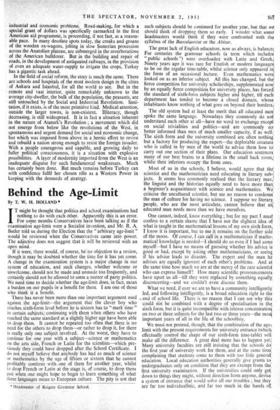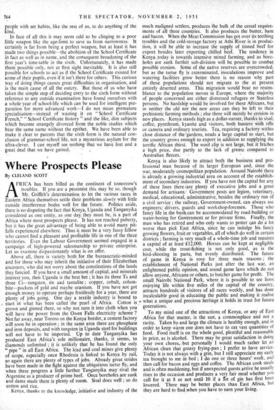Behind the Age-Limit
IT might be thought that politics and school examinations had nothing to do with each other. Apparently this is an error. For some months Conservatives have been talking as if the examination age-limit were a Socialist invention, and Mr. R. A. Butler told us during the Election that the " arbitrary age-limit " would be reviewed when the Conservatives came into power. The adjective does not suggest that it will be reviewed with an open mind. • If it were, there would, of course, be noobjection to a review, though it may be doubted whether the time for it has yet come. A change in the examination system is a major change in our system of education, and such changes, whether welcome or unwelcome, should not be made and unmade too frequently, and certainly should not be allowed to seem a matter of party politics. We need time to decide„whether the age-limit does, in fact, mean a burden on our pupils or a benefit for them. I am one of those who think it a benefit. There has never been more than one important argument used against the age-limit—the argument that the clever boy who reaches sixth-form level before he is sixteen has to ". mark time " in certain subjects; continuing with them when others who have reached the same standard at a slightly higher age have been able to, drop them. It cannot be repeated too often that there is no need for the others to drop them—or rather to drop it, for there is really only one subject involved. At the worst, they have to continue for one year with a subject—science or mathematics on the arts side, French or Latin for' the scientists—which pre- viously they could have dropped after the School Certificate. I do not myself believe that anybody has had so much of science or mathematics by the age of fifteen or sixteen that he cannot profitably continue with, one of them for another year, whilst to drop French or Latin at the stage is of course, to drop them just when one might hope to begin to learn something of what these languages mean to European culture. The pity is not that * Headmaster of Reigate Grammar School. such subjects should be continued for another year, but that wd should think of dropping them so early. I wonder what some headmasters would think if they were confronted with the syllabus of the Baccalaureat or the Abitur.
The great lack of English education, now as always, is balance For centuries the grammar schools (a term which included " public schools ") were overloaded with Latin and Greek Ninety years ago it was rare for English or modern languages to be on the regular time-table, whilst science only appeared in the form of an occasional lecture. Even mathematics were looked on as an inferior subject. All this has changed, but the! fierce competition for university scholarships, supplemented now by an equally fierce competition for university places, has forced the standard of sixth-form subjects higher and higher, till each department has tended to become a closed domain, whose inhabitants know nothing of what goes on beyond their borders. The old system had at least the merit that all educated men spoke the same language. Nowadays they commonly do not understand each other at all—have no word to exchange except on social trivialities and politics—and are commonly no better informed than men of much smaller capacity, if as well The sixth form and the university combined are often nothing but a factory for producing the expert—the deplorable creature who is called in by men of the world to advise them how to carry out one section of their plans. Our education sentences many of our best brains to a lifetime in the small back room; whilst their inferiors occupy the front ones. Most of us in the schools, I believe, would agree that the' scientist and the mathematician need educating in literary sub.. jects. It seems less commonly realised that the literary man, the linguist and the historian equally need to have more than a beginner's acquaintance with science and mathematics. We criticise the uncultured scientist, but see no reason to condemn the man of culture for having no science. I suppose we literary, people, who are the most articulate, cannot believe that an, educated man needs more than we have ourselves.
One cannot, indeed, know everything ; but for my part t must confess to a certain shame that I have not the slightest idea of what is taught in the mathematical lessons of my own sixth form I know it is important, but to me it remains on the further side of the moon. Of course, I can call in a mathematician if mathe-, matical knowledge is needed—I should do so even if I had some myself—but I have no means of guessing whether his advice is good or bad, except by asking other mathematicians, or seeing if his advice leads to disaster. The, expert and the man he advises are equally ignorant of each other's problems. And at the same time how much we are at the mercy of the rare scientist who can express himself! How many scientific pronouncements have upset us all—till they were replaced by something equally disconcerting—and we couldn't even discuss them. What we need, if ever we are to have a community intelligently, led, and following intelligently, is a broad education right to the . end of school life. There is no reason that I can see why this • could not be combined with a degree of specialisation in the1 sixth form, but it is quite incompatible with intense concentration] on two or three subjects for the last two or three years—the mos!' important years of all in the life of the schoolboy. We must not pretend, though, that the combination of the age1 limit with the present requirements for university entrance (which effectually control the shape of our sixth-form time-table) will make all the difference. A great deal more has to happen yet( Many university faculties are still insisting that the schools doi the first year of university work for them, and at the same tim complaining that students come to them with too little general( education. Local education authorities generally give grants to i undergraduates only on condition that they are exempt from the; first university examination. If the universities could only get, down to things they might, without direction from anyone, devise a system of entrance that would solve all our troubles ; but they are far too individualistic, and far too much is the hands ot people with set habits, like the • rest of us, to do anything of the kind, In face of all this it may seem odd to be clinging to a poor little weapon like the age-limit to save us from narrowness. It certainly is far from being a perfect weapon, but at least it has made two things possible—the abolition of the School Certificate in fact as well as in name, and the consequent broadening of the first year's time-table in the sixth. Unfortunately, it has made them possible only. not at first sight inevitable. It is also still possible for schools to act as if the School Certificate existed for some of their pupils, even if it isn't there for others. This curious way of doing things causes great difficulties in organisation, and is the main cause of all the outcry. But those of us who have taken the simple step of deciding entry to the sixth form without reference to any outside examination have found ourselves with a whole-year of school-life which can be used for intelligent pre- Paration for more advanced work—I .do not mean premature specialisation—instead of wasting it on " School Certificate French," " School Certificate history " and the like, dim_ subjects which become strangely divorced from the noble .studies which bear the same name without the epithet. We have been able to Make it clear to parents that the sixth form is the natural con- clusion of grammar-school life, not a mysterious asylum for the nitra-clever. I can myself see nothing that we have lost and a great deal that we have gained.



































 Previous page
Previous page